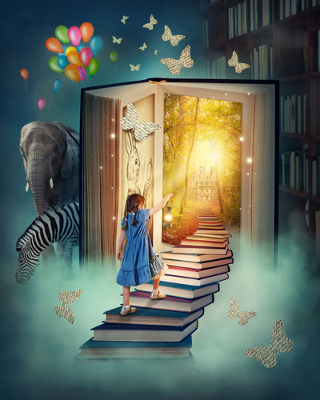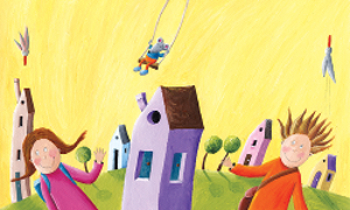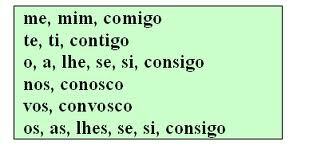Do you like to read? Do you like to listen and tell stories? If your answer is yes, you will certainly like to know what literature is.
Literature is one of the most beautiful artistic manifestations. While some artists paint pictures or make beautiful songs, others write. But knowing how to write is not enough, the true writer knows how to use words in a special, different way, which makes us travel to other worlds and imagine unusual situations. See how writing literature can be more difficult than you thought? Not all of us are gifted with putting thoughts into words and creating a magical world for the reader to enjoy.
Literature has the word as its raw material. It is from there that the artist transforms language, making it more expressive and poetic. In the texts we are exposed to in our daily lives, in newspapers, magazines and textbooks, the language has the characteristic of being objective and clear, however, in the literature, there is no commitment to transparency. Words can be used in their connotative sense, that is, outside of their real meanings. Literary texts are filled with elements responsible for making them an art object. To understand them, it is necessary to train reading and sharpen the aesthetic sense. This happens because literature is concerned with contemplating not only the linguistic object, but also the plasticity and beauty that are found only in art.
What turns a text into a literary text and the language function chosen. In the case of literature, we find the poetic function of language, which happens when the sender, that is, the one who writes, has their intentions focused on the elaboration of the message. There is a care with the construction of meanings of words, expressions and content. The words are not chosen randomly, each element is carefully chosen so that the result is considered art.

Literature is the art of words. Through it the reader can be transported to different worlds!
Now that you've started to understand the art of words, how about knowing a little more about the origin of literature? When we ask ourselves “what is literature?” we are asking a historical question. It is not an easy task to specify its origin, but the graphic-visual representation of the sounds of our own speech, writing, has its first registers in the 12th century (B.C.) Phoenician alphabet. Therefore, from the moment man learned to use the written word, he started to register stories that previously existed only in the oral tradition, which gave rise to the first texts literary. Aristotle, a Greek philosopher who lived between 384 and 322 (B.C.), was one of the first to think about and systematize the subject. His ideas about literature were very important for the study of art, however, as well as communication, literature evolved and ended up taking on new forms, and certain genres that were not considered literature by Aristotle before, such as letters, biographies and diaries, can now be seen as art literary.
In Brazil, literature is a little more recent, because we are a relatively young nation, with little more than five hundred years of history to tell. Our first literary text, written in Brazilian lands, is the Letter from Pero Vaz de Caminha, a kind of travel diary made by the scribe of the then king of Portugal. Despite having as its main intention to inform the king of the peculiarities of the discovered land, there are elements in the letter that make it a literary text, given Pero Vaz de Caminha's skill with the words. The Letter is very famous for being the first historical record of Brazil, being also considered an integral part of Portuguese literature.
Literature has the function of communicating in an artistic way, using its inexhaustible power of evocation and suggestion to allow the reader to recreate the very reality in which he is inserted. Thanks to the talent of our writers, who make literature a life experience, we can, even if for some hours or minutes, switch from real life experience to a magical experience with the abstract and language symbolic. For you to enjoy reading and knowing a little more about literature, a beautiful poem by Carlos Drummond de Andrade, one of those incredible artists who, through their poetic function, transport us to the wonderful realm of words. Good reading!
“(...) It penetrates deafly into the realm of words.
There are poems waiting to be written.
They are paralyzed, but there is no despair,
there is calm and freshness on the unbroken surface.
Here they are alone and mute, in a dictionary state.
Live with your poems, before writing them.
Have patience if obscure. Calm down if you are provoked.
Expect each one to be fulfilled and consumed
with your word power
and its power of silence.
Don't force the poem out of limbo.
Do not pick up the lost poem on the ground.
Don't flatter the poem. accept it
how will it accept its definitive and concentrated form
in space.
Step closer and contemplate the words.
Each one
has a thousand secret faces under the neutral face
and asks you, not interested in the answer,
poor or terrible, whatever you give him:
Did you bring the key? (...)”.
(Fragment of the poem “Search for poetry”, by Carlos Drummond de Andrade)
By Luana Castro
Graduated in Letters


